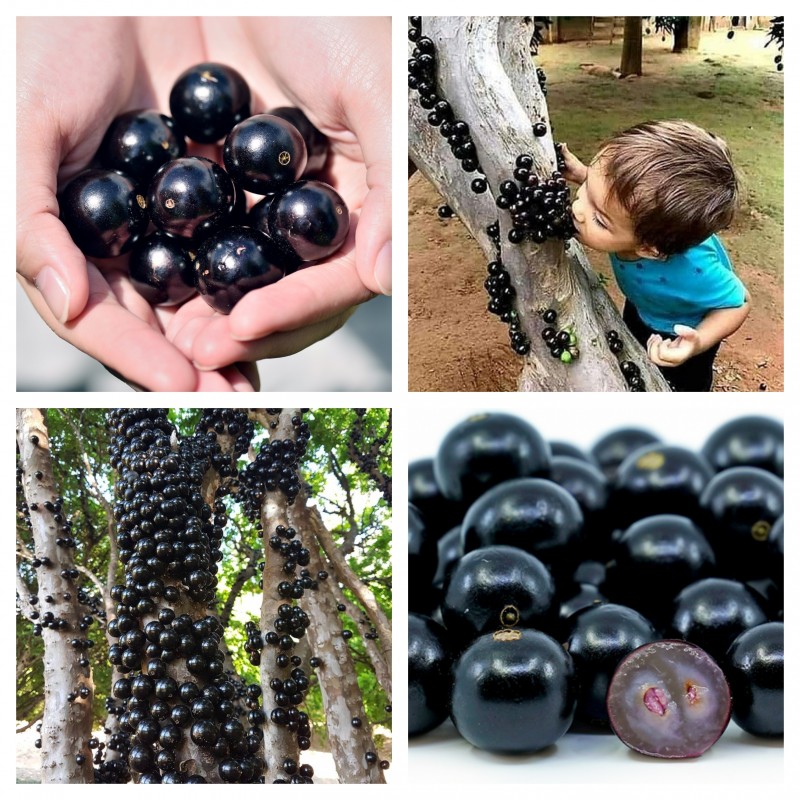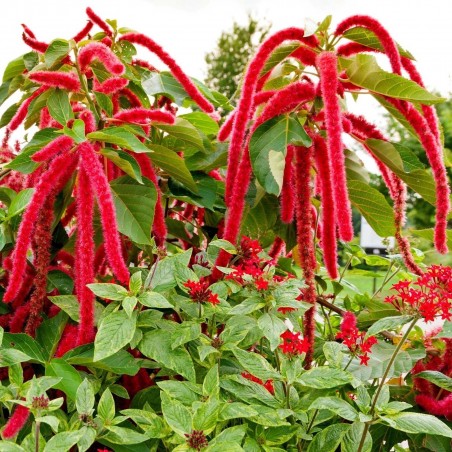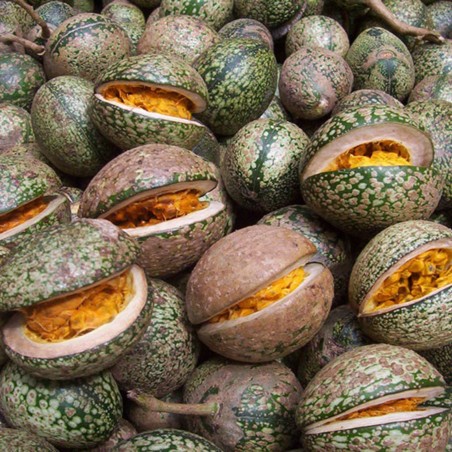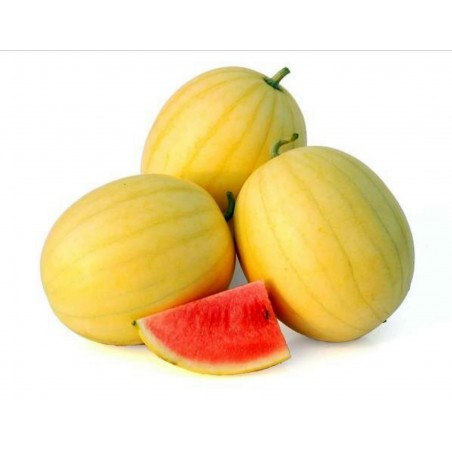
Brazilian Grapetree, Jabuticaba Seeds
🍇 Brazilian Grapetree, Jabuticaba Seeds (Plinia cauliflora)
💰 Price: Package of 2 Seeds
🌿 Jabuticaba, also known by several names such as Jaboticaba, Jabotica, Jabuticabeira, and Yvapuru, is a subtropical evergreen tree native to the southeastern regions of Brazil, particularly the states of Minas Gerais and São Paulo. The tree is most famous for its cauliflorous fruits, which grow directly from the trunk of the tree 🌳, creating a unique and stunning visual effect. These small, thick-skinned berries are 3–4 cm in diameter and have a purple, astringent skin that encases sweet, white or rosy pink gelatinous flesh 🍇. The fruit’s seeds, typically one to four per berry, add an interesting texture to the fruit.
Jabuticaba trees are slow-growing but can live for decades, making them a long-term investment for any garden. Their young leaves start out salmon-colored, turning green as they mature 🍃. While the trees can fruit once or twice a year in their natural environment, they thrive with consistent irrigation 💧 and can even produce fresh fruit year-round in tropical climates 🌞.
🌱 How to Grow Brazilian Grapetree, Jabuticaba Seeds (Plinia cauliflora)
Soil Requirements:
Jabuticaba trees prefer moist, rich, slightly acidic soils 🌱 but are adaptable to various soil types, including slightly alkaline sandy soils. Proper irrigation is key for healthy growth, especially in areas where water is scarce 🌊. The tree is drought-tolerant, though fruit production may decline during prolonged dry spells 🌵.
Planting & Germination Tips:
To germinate Jabuticaba seeds successfully, follow these steps:
-
Soak seeds in warm water 💦 for 24 hours before sowing.
-
Sow seeds 0.5–1 cm deep in a mixture of coir, sand, or perlite to promote good drainage 🌿.
-
Maintain a minimum germination temperature of 20°C (68°F) 🌡️ and keep the soil consistently moist 🌧️.
-
Germinate in darkness 🌚 to help the seeds sprout.
-
Be patient, as seedlings grow slowly ⏳. Jabuticaba trees typically take 10–20 years to bear fruit if grown from seed, though grafted plants may fruit in just 5 years 🌱.
🌞 Cultivation & Care Brazilian Grapetree, Jabuticaba Seeds (Plinia cauliflora)
Jabuticaba trees are perfect for dedicated gardeners with a bit of patience. While they are slow-growing, they can live for many years and are well-suited to container cultivation 🪴 or bonsai due to their slow development and unique trunk-fruit formation 🌳🍇. The tree is fairly drought-tolerant but should be watered consistently during dry periods to maintain fruit production 💧. Jabuticaba trees are intolerant of salty soils 🌊 and salt spray, so avoid planting them near coastal areas or areas with excessive salinity.
In tropical and subtropical climates 🌍, Jabuticaba trees can be kept in containers and grown indoors as ornamental trees or bonsai plants 🌿. The tree’s ability to adapt to various conditions makes it an excellent choice for gardeners looking for an unusual edible or ornamental plant 🌺.
🍇 Uses & Benefits Brazilian Grapetree, Jabuticaba Seeds (Plinia cauliflora)
-
Fresh consumption of the sweet, gelatinous fruit 🍇
-
Used to make jams, tarts, wines, and liqueurs 🍷
-
Grown as a bonsai or container ornamental tree 🪴
-
Attracts birds 🐦 and beneficial insects 🐝 to the garden
🌍 Hardiness & Adaptation
Jabuticaba is adaptable to tropical and subtropical climates 🌿. It tolerates mild frosts ❄️, drought periods 🌞, and a variety of soil types, making it a resilient choice for the garden. However, due to its slow growth, it’s ideal for gardeners looking for a unique, long-term addition to their collection 🏡.
🔑 Focus keyphrase: Brazilian Grapetree, Jabuticaba Seeds (Plinia cauliflora)
🔑 Related keyphrases: jabuticaba seeds, brazilian grapetree seeds, jaboticaba tree, tropical fruit trees, subtropical fruit trees, bonsai fruit tree, edible ornamental plants


Your review appreciation cannot be sent
Report comment
Report sent
Your report cannot be sent
Write your review
Review sent
Your review cannot be sent
🌍 Worldwide Shipping from the EU
We ship worldwide from the European Union using registered air post with signature confirmation on delivery.
📦 Tracking Your Order
Log in to your account and go to Order History > Details to find your tracking number.
You will receive email notifications at every step — please check your spam/junk folder if you don’t see them.
Track your package via:
⚠️ Important Notices
Cash on delivery is not available.
Always provide a valid mobile number with country code when ordering (e.g., +365 456 7686 576).
Do not order to P.O. Boxes or if you cannot be home to sign for the package. We cannot leave parcels with neighbors.
If a package sent to a P.O. Box is lost or undelivered, you lose the right to a refund.
📦 Lost, Returned & Reshipping Packages
For customers in Brazil and Mexico:
We cannot refund packages lost or destroyed by customs.
If your package is returned, we will refund only the product cost — shipping costs are not refundable.
You must pay return postage (€2) and any costs for reshipping.
If a package is returned to us for any reason, you are responsible for paying the return shipping (€2) plus the cost to resend the package.
🚚 Shipment Delivery
Registered shipments require a signature from the recipient.
If your tracking shows the package is still at the origin post office, it means the package is in transit — please contact your local post office directly for updates.
We are not responsible for delivery times and cannot track shipments for you.
📅 Delivery Options & Estimated Times
Delivery Option Processing Time Notes Priority Delivery Ships in 1-7 business days Prioritizes order processing (not guaranteed faster delivery); delays possible during holidays (3-10 days) Secured Delivery Ships in 1-7 business days Available for orders up to €150; refund if lost Standard Delivery Ships in 7-10 business days More economical; delays possible during holidays (7-14 days) Estimated Delivery Time:
Within the EU: 3–20 days
Worldwide: 5–30 days
Example delivery times to the USA:
Delivered in 13, 17, 19, 22, or 27 days.Note: Delivery times depend on your location and the local postal system. COVID-19 may cause additional delays.
💰 Shipping Costs
Shipping and handling fees are calculated automatically during checkout based on the weight of the parcel and the destination country.
⏰ Order Processing Hours
We do not process or ship orders on Saturdays or Sundays.
💳 Payment Options
Bank Transfer (SEPA / IBAN / SWIFT-BIC)
Include your order reference in the payment description (e.g., "SGS-19811702"). Orders without payment within 7 days are automatically cancelled.PayPal
Payments accepted in Euros only. Please select Euros at checkout.Card Payment
For card payments, visit our other site: Exotic Seeds Store
We accept Visa, MasterCard, American Express, CB, Diners Club, Discover, China UnionPay, JCB, and Discover.
⚠️ Transaction Fees
Customers are responsible for any transaction fees. Please provide payment details to help us process your order efficiently.
📢 Final Notes
Before placing your order, please check our website for any special notices, holiday schedules, or specific conditions that may affect your purchase.
Related Products



















